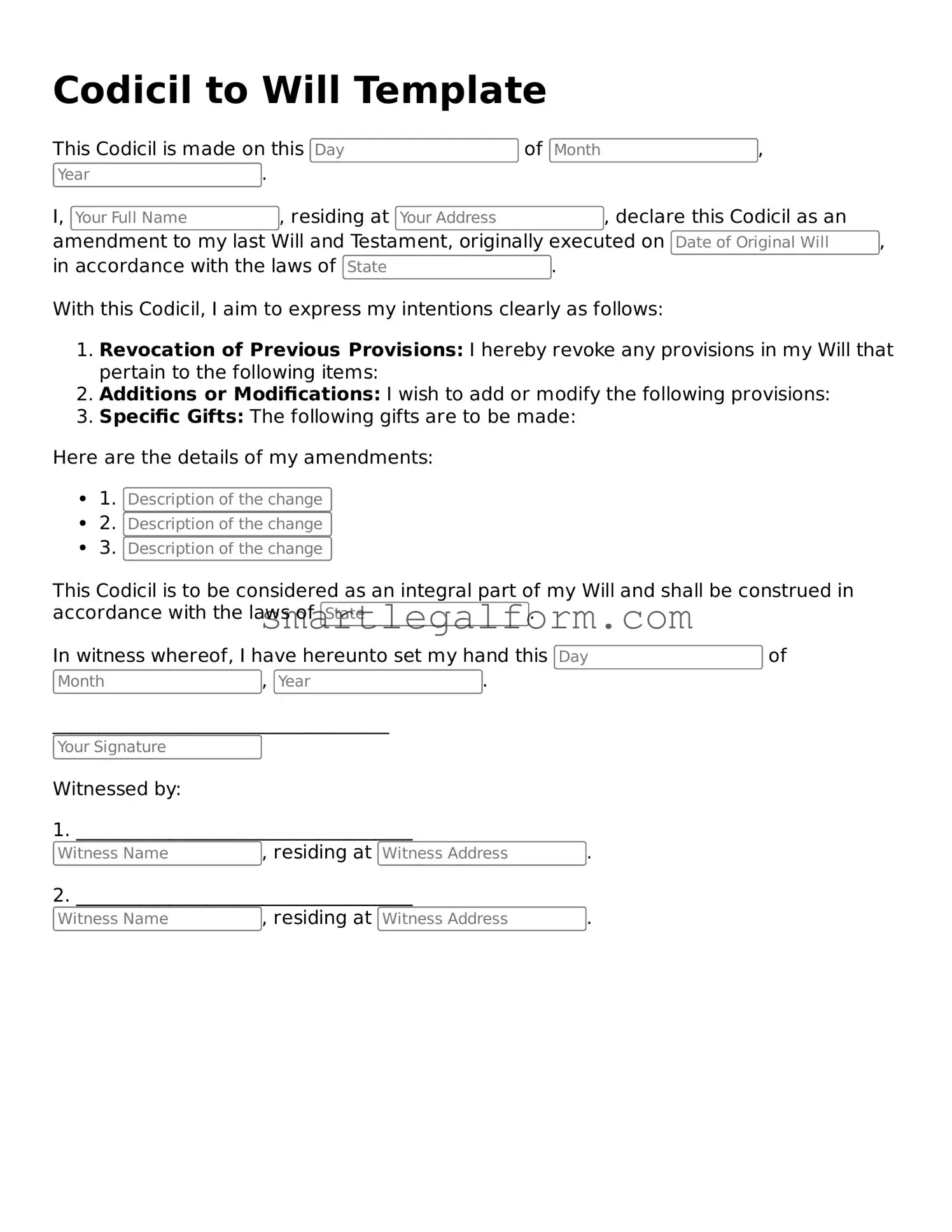Attorney-Approved Codicil to Will Form
Form Preview Example
Codicil to Will Template
This Codicil is made on this of , .
I, , residing at , declare this Codicil as an amendment to my last Will and Testament, originally executed on , in accordance with the laws of .
With this Codicil, I aim to express my intentions clearly as follows:
- Revocation of Previous Provisions: I hereby revoke any provisions in my Will that pertain to the following items:
- Additions or Modifications: I wish to add or modify the following provisions:
- Specific Gifts: The following gifts are to be made:
Here are the details of my amendments:
- 1.
- 2.
- 3.
This Codicil is to be considered as an integral part of my Will and shall be construed in accordance with the laws of .
In witness whereof, I have hereunto set my hand this of , .
____________________________________
Witnessed by:
1. ____________________________________
, residing at .
2. ____________________________________
, residing at .
Common mistakes
When individuals decide to amend their wills using a codicil, they often overlook important details that can lead to complications. One common mistake is failing to properly identify the original will. It is crucial to reference the original document accurately, including the date it was executed. Without this information, the codicil may not be considered valid, leading to confusion about which will governs the estate.
Another frequent error involves the lack of clarity in the changes being made. A codicil should clearly outline the specific amendments to the will. Vague language or ambiguous terms can result in misinterpretation. It is essential to be explicit about what is being changed to ensure that the intentions of the testator are honored.
People often neglect to sign the codicil in accordance with state laws. Each state has specific requirements regarding signatures and witnesses. Some states may require the codicil to be witnessed or notarized. Failing to adhere to these legal requirements can render the codicil invalid, undermining the entire purpose of the amendment.
Additionally, individuals may forget to date the codicil. A date provides a timeline for when the changes were made and can be critical in determining the testator's intentions. Without a date, there could be disputes regarding which document should take precedence, especially if multiple codicils exist.
Another mistake is not considering the implications of the changes on the overall estate plan. Changes made in a codicil can affect various aspects of an estate, including tax implications and the distribution of assets. It is advisable to review the entire estate plan to ensure that the codicil aligns with the testator's overall wishes.
Finally, individuals sometimes fail to communicate the existence of the codicil to relevant parties. Informing heirs and executors about the codicil is vital. If the codicil is not disclosed, it may not be found when needed, leading to potential disputes and confusion among beneficiaries.
Dos and Don'ts
When it comes to updating a will through a codicil, attention to detail is paramount. Here are some important do's and don'ts to consider while filling out the Codicil to Will form:
- Do ensure that you clearly identify the original will by including the date it was executed.
- Do write the codicil in clear and unambiguous language to avoid confusion.
- Do sign and date the codicil in the presence of witnesses, as required by your state law.
- Do keep the codicil with your original will in a safe place.
- Don't make changes to the original will itself; instead, use the codicil to make amendments.
- Don't forget to check your state’s specific requirements for codicils, as they can vary.
- Don't use vague terms or references that could lead to misinterpretation.
- Don't neglect to inform your executor and beneficiaries about the codicil and its contents.
Similar forms
- Will: A will outlines how a person's assets will be distributed after their death. Like a codicil, it serves to express the individual's wishes regarding their estate.
- Living Will: This document specifies a person's healthcare preferences in case they become unable to communicate. Similar to a codicil, it allows for updates to reflect changing wishes.
- Power of Attorney: This grants someone authority to make decisions on behalf of another. Both documents can be modified to reflect new choices or circumstances.
- Trust: A trust manages assets for beneficiaries. Like a codicil, it can be amended to adjust how assets are handled or distributed.
- Advance Healthcare Directive: This combines a living will and power of attorney for healthcare. It allows for changes to be made in response to evolving medical situations, similar to a codicil's purpose.
- Arizona Last Will and Testament: This legal document is essential for outlining asset distribution and care of dependents, ensuring compliance with one's wishes, and can be managed conveniently through All Arizona Forms.
- Revocable Trust: This type of trust can be changed or revoked during the grantor's lifetime. It shares the flexibility of a codicil in modifying estate plans.
- Affidavit: A sworn statement used to confirm facts. Changes can be made to an affidavit just like a codicil alters a will.
- Letter of Instruction: This informal document provides guidance to loved ones about personal wishes. It can be updated easily, much like a codicil.
- Beneficiary Designation Forms: These specify who receives assets like life insurance or retirement accounts. They can be changed at any time, similar to how a codicil updates a will.
